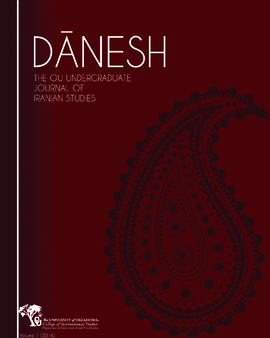| dc.contributor.author | Eckenrode, Nicholas | |
| dc.contributor.editor | Akhlaghi, Andrew | |
| dc.contributor.editor | Gharipour, Elena T. | |
| dc.contributor.editor | Bednarek, Ellie | |
| dc.contributor.editor | Gellman, Jonah | |
| dc.contributor.editor | McCann, Samuel | |
| dc.contributor.editor | Siddiqui, Wajeeha | |
| dc.contributor.editor | Yoo, Jiyoun | |
| dc.creator | Eckenrode, Nicholas | |
| dc.date.accessioned | 2016-02-24T16:47:36Z | |
| dc.date.accessioned | 2021-04-14T15:38:20Z | |
| dc.date.available | 2016-02-24T16:47:36Z | |
| dc.date.available | 2021-04-14T15:38:20Z | |
| dc.date.issued | 2016 | |
| dc.identifier.uri | https://hdl.handle.net/11244.46/59 | |
| dc.description.abstract | The air was crisp as President Jimmy Carter entered the building. Uncharacteristically cold, even by Iran’s standards. It was New Year’s Eve 1977 and Carter was making his first trip to Iran to continue the long standing relationship between the two countries. Raising his glass, Carter toasted the Shah claiming him to be the one leader in the world he felt to have the most “personal friendship.”1 Carter had been in office just under a year. This was barely enough time for a President to build a relationship strong enough with any leader, let alone one man that took precedence over all others. In reality, Carter had inherited a relationship with the Shah that had begun decades prior—a relationship built on lofty promises, weapons sales, and oil production. The two were dependent on each other. | en_US |
| dc.description.abstract | Much has been written on U.S.-Iranian relations leading up to 1979. The fall of the embassy came as a shock to the American public who previously thought of Iran as their chief ally in the Middle East. The ensuing crisis not only saw Iran fall out of favor with America but left President Jimmy Carter being viewed as a pariah for the loss of a key U.S. ally. The perceived weakening of American influence all but eliminated Carter from winning office again in 1980. | en_US |
| dc.description.abstract | President Carter let Iran slip away only for the world to watch it become the Islamic Republic while undermining US strength on the international stage. For decades, this has been the accepted rhetoric. To accept this without consideration is not only a disservice to Carter, but it also overlooks a myriad of steps taken by preceding Presidential administrations and the Shah’s own miscues in the decades prior. The truth is that the U.S. led coup of Iranian Prime Minister Mohammad Mosaddeq in 1953 triggered a series of events that led to impending disaster. What followed with geopolitical issues, mutual interests, and economic greed played a crucial role in US-Iranian relations. So intertwined were the two countries that when President Carter assumed the role of President he was inheriting a force in motion which he could not possibly have control over. | en_US |
| dc.description.sponsorship | The OU Iranian Studies Program | en_US |
| dc.format.extent | 14 pages | |
| dc.format.extent | 2,011,065 bytes | |
| dc.format.medium | application.pdf | |
| dc.language.iso | en_US | en_US |
| dc.relation.ispartofseries | Dānesh ; 1 (2016) | |
| dc.relation.requires | Adobe Acrobat Reader | |
| dc.rights | Attribution-NonCommercial-ShareAlike 3.0 United States | * |
| dc.rights.uri | https://creativecommons.org/licenses/by-nc-sa/3.0/us/ | * |
| dc.subject | United States -- Foreign relations -- Iran | en_US |
| dc.subject | United States -- Foreign relations -- 1945-1989 | |
| dc.subject | Iran -- Foreign relations -- United States | |
| dc.title | Who lost Iran? : a critical reassessment of U.S. foreign policy towards Iran, 1953-1979 | en_US |
| dc.type | Article | en_US |
| dc.type | Document | |
| dc.type | text | |
| dc.contributor.sponsor | Farzaneh Center for Iranian and Persian Gulf Studies | |
| dc.contributor.sponsor | University of Oklahoma. College of International Studies | |
| dc.contributor.sponsor | University of Oklahoma. College of International Studies. Department of International and Area Studies | |
| dc.description.undergraduate | undergraduate | |

